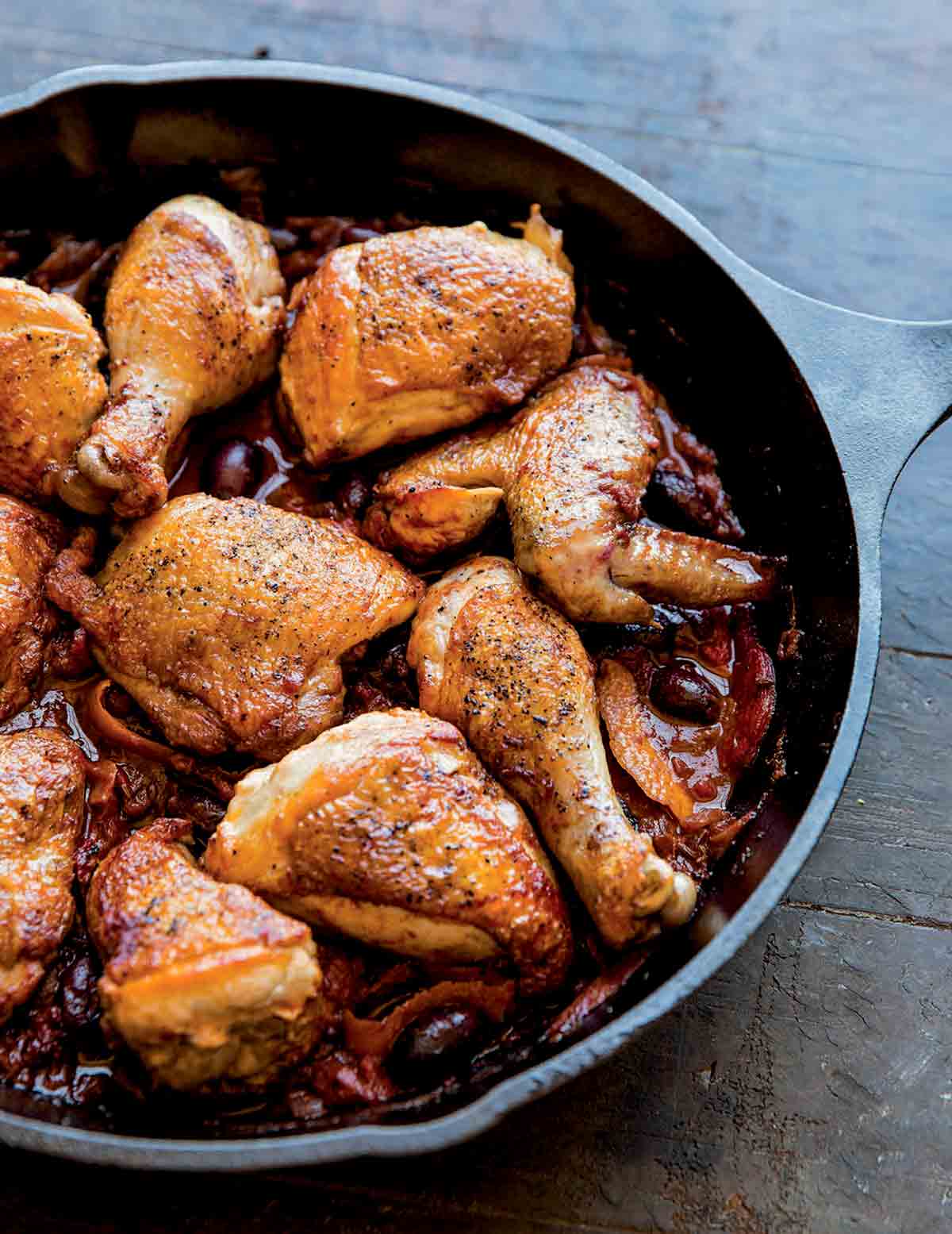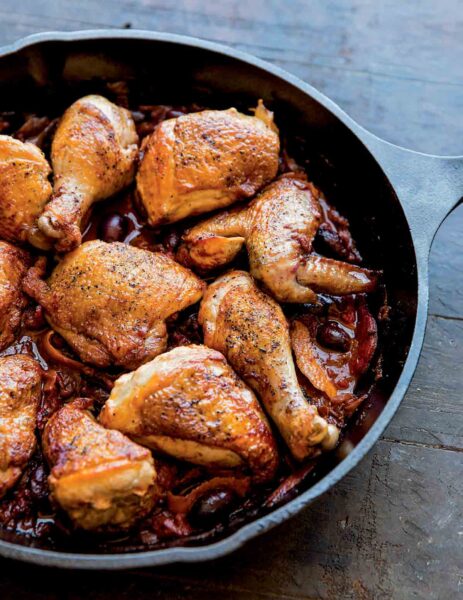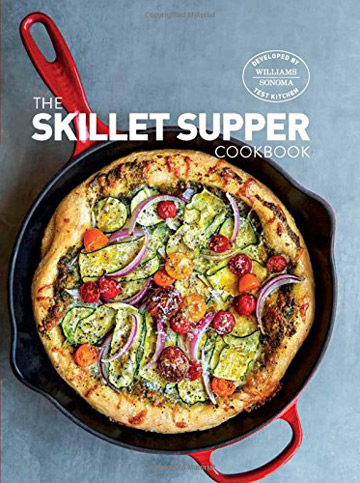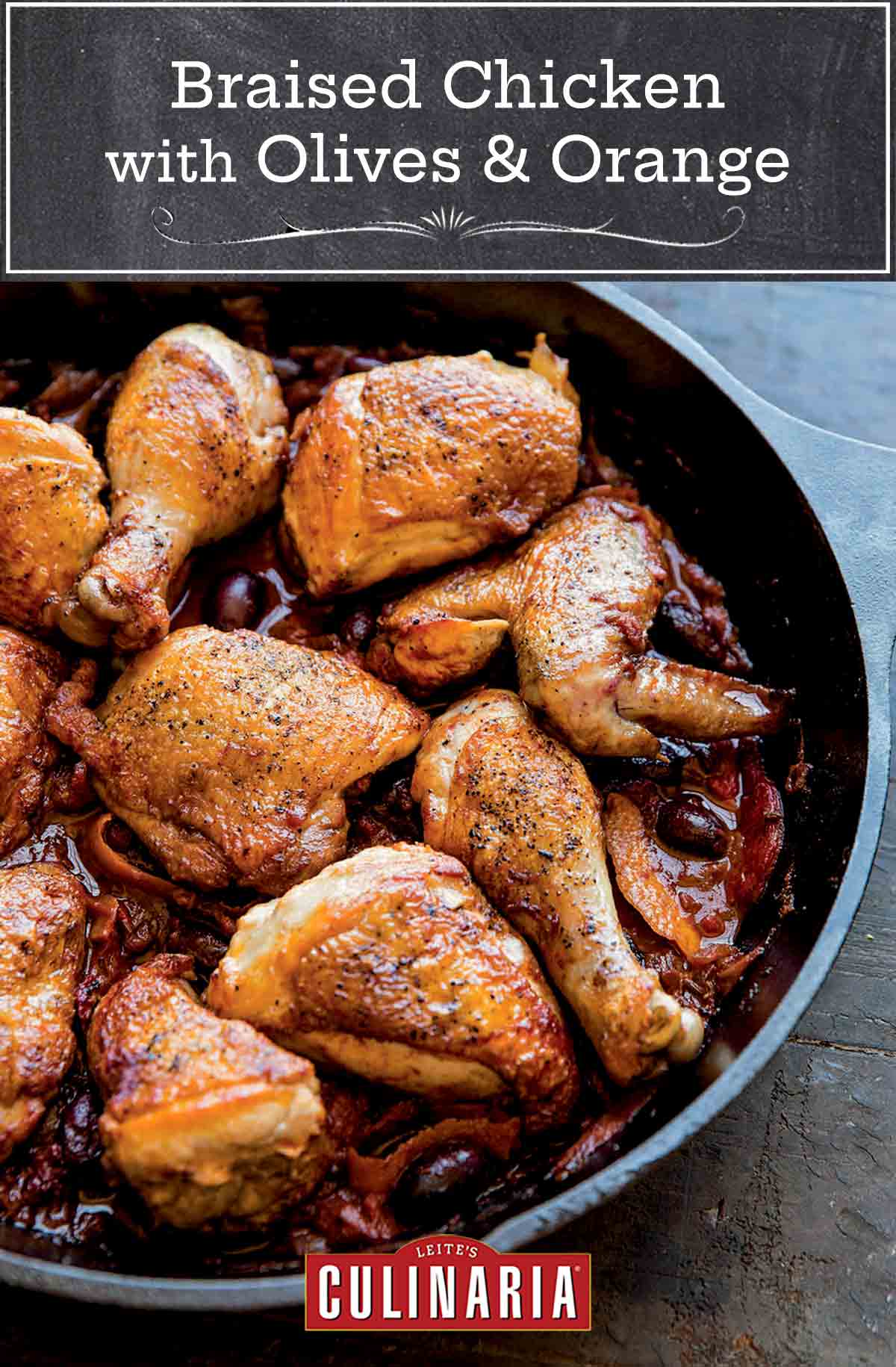
Braised chicken with olives and orange is as elegant and impressive as it sounds easy yet also easy as can be to make. Bone-in chicken pieces are simply simmered and infused with the flavors of tomatoes, oranges, and olives. What results delivers everything we love most about chicken—incredibly tender meat, superbly crisp skin, and flavor aplenty.–Angie Zoobkoff
Braised Chicken with Olives and Orange FAQs
You can trade out the cut-up whole chicken for bone-in, skin-on chicken thighs, and/or breasts
here. Plan on one or two pieces for each diner, depending on the appetites of your tablemates
and the size of the pieces.
Some of our testers found that the ingredients really filled up their normal-sized skillet. If you have a larger, or deeper, cast-iron skillet you might prefer trying to maneuver that in and out of the oven. Just be aware that this recipe makes a lot, and cast-iron gets very, very hot so pull on those oven mitts and stay safe.
Want to save this?

Braised Chicken with Olives and Orange
Ingredients
- One (3 1/2-pound) chicken, cut into 10 pieces
- Kosher salt and freshly ground black pepper
- 2 1/2 teaspoons sweet paprika
- 3 tablespoons olive oil
- 1 medium (7 oz) yellow onion, diced
- 2 cloves garlic, chopped
- 2 teaspoons fennel seeds
- 3/4 cup red wine
- 1 1/2 to 2 cups store-bought or homemade chicken stock
- One (14.5-oz) can diced tomatoes with juices
- 3/4 cup black olives, such as Kalamata, pitted if desired
- Zest and juice of 1 orange (zest removed in strips with a vegetable peeler), preferably organic
- 1 cup roasted yellow bell pepper slices
- Steamed rice, couscous, quinoa, or polenta, for serving
Instructions
- Preheat the oven to 350°F (180°C).
- Pat the chicken dry and season it with salt and pepper. Sprinkle the chicken all over with the paprika.
- In a large ovenproof skillet over medium-high heat, warm 2 tablespoons of oil. Working in batches, add the chicken to the skillet and cook until browned on both sides, 6 to 8 minutes. Move the chicken to a plate. Pour off the fat from the skillet.
- In the same skillet over medium-high heat, warm 1 tablespoon oil. Add the onion and cook, stirring occasionally, until translucent, 4 to 6 minutes. Add the garlic and cook, stirring occasionally, for 1 minute. Add the fennel seeds and cook, stirring, for 30 seconds. Add the wine and cook, stirring and scraping up the browned bits, until reduced to 1/2 cup, about 2 minutes.
- Add the stock, tomatoes with their juices, olives, orange zest and juice, and bell peppers. Bring the liquid to a simmer, then return the chicken to the skillet, skin side up. Make sure the top of the chicken isn’t covered with liquid. (If your chicken is fully submerged or if your skillet is dangerously full, go ahead and ladle out 1 to 2 cups of the liquid and discard it or reserve it for another meal.)
- Carefully slide the skillet into the oven and roast until the chicken is tender and cooked through, 35 to 40 minutes. Using a slotted spoon, move the chicken to a plate. Place the skillet over medium-high heat and simmer until the sauce has thickened slightly, 10 to 15 minutes. Discard the orange zest and season with salt and pepper. Return the chicken to the skillet and serve straightaway. Serve alongside rice, couscous, or polenta to soak up all that delicious sauce.

Explore More with AI
Nutrition
Nutrition information is automatically calculated, so should only be used as an approximation.
Recipe Testers’ Reviews
This braised chicken with olives and orange makes a perfect weekday meal but is also impressive enough to serve guests. It’s easy to put together and fills the house with a wonderful aroma that makes your guests count the minutes until dinner is ready. I fed 6 guests (4 adults and 2 children).
I served the chicken with creamy polenta, but egg noodles or mashed potatoes would also be great. As a bonus, this recipe makes enough sauce to save for another use. I cooked my leftover sauce down to a thick consistency and it made an amazing sauce to accompany pork loin. We ate all the chicken but saved the leftover sauce in the refrigerator for 2 days. I was cooking a pork loin, so I reduced the sauce for about 10 minutes and served it over the pork loin and roasted mushrooms. The fennel and orange notes in the sauce had intensified and created a rich and delightful sauce.
When we read the ingredient list and saw oranges and olives and fennel, we knew we had to make this braised chicken with olives and orange recipe. The method is easy to follow and the resulting dish makes a wonderful meal. We served the chicken and sauce over couscous for Sunday supper and our tasters loved it.
And important to note—leftovers were even more deeeee-licious. We used our largest cast-iron skillet and if you do, too, be aware—the liquid comes near the top of the pan, the whole dish is full, and very, very heavy. We placed the skillet on a big sheet pan before putting it into the oven. You really have to be strong to move the entire meal into the oven—wear long oven mitts.
The combination of olives and orange is an intriguing one and this recipe delivers the goods. Preparation was straightforward—a classic method of searing the meat then building the flavors. When the chicken comes out of the oven, it’s tender and juicy and the flavors of the olives and orange come shining through. And the fennel seeds add a sweet accent.
I used an Italian red blend of Syrah, Cabernet Sauvignon, and Sangiovese. There is plenty of sauce to enjoy. This recipe is a fun twist on a Mediterranean dish that can easily be adapted for other meat such as pork.
This was such a lovely braised chicken with olives and oranges dish. We all loved the combination of tomatoes and olives and oranges and the chicken was incredibly tender.
Lovely tastes. The prep and active time make this a little more time-consuming at the front end than simply roasting the chicken entirely in the oven, but the result was worth it, even if it isn’t a Monday night quick meal. I did keep it simple by using all dark meat—5 whole thigh-leg pieces, which my friendly butcher offered to separate for me, leaving me a nice 10-piece set which easily served 5 to 6 people.
I pitted my own Kalamatas, using a shot glass gently pressed on each olive, which easily releases the pit. I used a Cara Cara orange and while the recipe indicates removing the zest, since it’s pretty and a nice accent, I left it in. After browning the chicken, I ladled out the fat and then proceeded. The onions are just starting to brown a bit as they became translucent and there was a nice fond building in the skillet. We served this with rice and it was delicious—a little more work than hands-off roasting a chicken, but with a nice balance of flavors.
Safety tip: Think about how you are going to move the skillet in and out of the oven, especially if your pan doesn’t have a helper handle. I used a pair of Ove gloves and still burned my arm on the skillet. I used the larger skillet to have a shallower cooking space even though it was not my favorite pan. Also, use a small ladle or spoon to remove fat rather than pour if your pan is especially heavy (as mine was).
Pan size aside, I am reluctant to cook a high-acid dish like this (with wine and tomato) in cast iron, although the photograph suggests that. I would only do so with an enameled skillet, which I don’t have, partly because of how much they weigh.
















I made this last night and it was very good! Next time I will add a little more spice. You need to include the Kalamata olives as it just adds another layer of flavor. There is a lot of liquid so I would go with the lessor amount of chicken stock. I did use rice for the bed of this dish. My husband loved it!! A keeper!!
Thanks, Karen! We’re so pleased you and your husband enjoyed it so much.